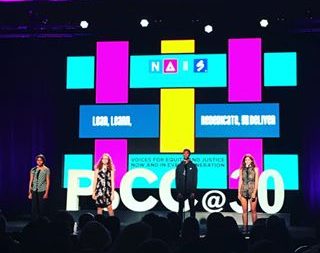Black, White, and Sage all Over

January 18, 2018
Five students and chaperones attended the People of Color Conference that took place in Anaheim from Nov. 30-Dec.2, an event attended regularly by members of the community every year depending on location.
The mission of the conference is to provide a safe space for people of color from different independent schools to network and develop professionally as allies. This year there were 6000 people in attendance.
“For me, POCC is a space for growth, learning, and fellowship with other people of color who have similar roles in their independent schools to me. It is most definitely an affinity space,” math teacher Dr. Ishii, said, who has attended POCC for the past eight years.
He first became involved as one of the affinity groups facilitator six years ago, and in January 2017, was asked by the National Association of Independent Schools to co-chair the conference.
The conference lasts for three days and consists of a pre-conference followed by day-long workshops with breakfast. Each day, the co-chairs introduce keynote speakers in the morning and late afternoon. The co-chairs oversee a committee of about 25 people that have six different subcommittees that work on selecting the speakers, choosing the workshops and the school visits.
In addition, each day has race-based affinity group spaces that are facilitated and overseen by other adults. Parallel to POCC is SDLC, on the last day the students lead the adults from the same school in discussions or activities.
“That is always my favorite part of the conference because we get to see them lead and it is always an awesome learning experience,” said Dr. Ishii.
The conference’s theme, Voices for Equity and Justice Now and in Every Generation, is implemented back into the Sage community by the members who attend the conference.
“I think that our theme is a call to action for all schools. We should all be striving for equity and justice in our communities,” Ishii said.
The mission is to promote fair learning and social experiences regardless of people’s backgrounds on campus. The conference can be seen as a call for students and adults of Sage to work together in order to understand the cycle of collaboration work that is done at the micro level at POCC. Student’s feedback shows that the affinity group experience is transformative because it provides a new kind of affirming support.
Being a student of color or belonging to other marginalized groups at an independent school can feel isolating. Affinity groups can facilitate navigation through school and by giving students the support they need to feel safe in any environment.
“This is a call for students and faculty and staff at all levels to be working for this not just right now but to have it be sustainable for future generations of student,” Ishii said.

